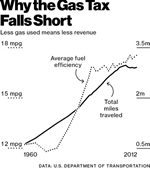The Environmental Protection Agency just announced that new vehicles achieved all-time-high fuel economy in 2013. Model year 2013 vehicles achieved an average of 24.1 miles per gallon (mpg) – a 0.5 
mpg increase over the previous year and an increase of nearly 5 mpg since 2004.
Fuel economy has now increased in eight of the last nine years. The average carbon dioxide emissions are also at a record low of 369 grams per mile in model year 2013.
While that news is good for people’s pocketbooks and good for the environment, it is bad for the Highway Trust Fund. Less gas consumption means less gas-tax revenue. With cities growing faster than suburbs and federal fuel standards set to rise more than 40 percent by 2020, revenue from the tax will continue to decline.
A redesigned Highway Trust Fund is one of the biggest challenges facing the House Transportation and Infrastructure Committee and a variety of options are being reviewed to pay for it.
Options include repatriation of offshore corporate taxes, a rising price index on the gas tax, and oil exploration and production off shore and on federal lands. But, states that pay a larger share of the projects could get put on the fast track to approval.
At a recent roundtable discussion, Rep. Bill Shuster (R-Pa.), chairman of the House Transportation and Infrastructure Committee, and Rep. Steve Womack, (R-Ark.), said their goal is to get a five- to six-year Highway Trust Fund bill passed next year to create some “certainty” for large ongoing projects.
Meanwhile, on the Senate side, Environment and Public Works Chair Barbara Boxer (D-Calif.) said she isn’t giving up on solving the long-term funding issue this year. Boxer said she plans to meet with leaders of the tax-writing committees to present her list of five to six sustainable funding options.

